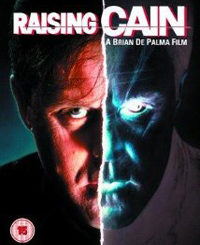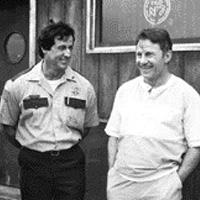 The People Vs. Larry Flynt
The People Vs. Larry Flynt
With Woody Harrelson, Courtney Love, Edward Norton
Written by Scott Alexander and Larry Karaszewski
Directed by Milos Forman
by William Ham
Have we run out of virtuous, upstanding people to make movies about? Are there no real-life heroes to bathe in the angelic glow of the projection lamp anymore? I guess not – we’re even having a tough time making them up of late. Revisionism’s the name of the game, taking flawed and even despised men and using them to turn the audience’s sympathies back on themselves. Oliver Stone, as is his wont, started this particular ball rolling a couple of years back, giving Nixon the tortured gravity of a Shakespearean tragic hero; now we’ve stopped waiting for our anti-heroes to get planted before we go after our spin doctorates in cosmetic image surgery. In these two films, both challenging and provocative in their own way, we are asked to see two infantile, sex-obsessed millionaires pretty much for what they are and still be expected to applaud their persistence and inner strength in the face of adversities they know damn well they brought upon themselves. And, in spite of our better judgments and all evidence to the contrary, we end up liking the assholes. Go figure.
Larry Flynt, by his own admission, is a hard man to love, the kind of guy that proclaims that a woman with sperm on her face is the summit of artistic beauty. (I knew the Mona Lisa was missing something.) Hell, even Bob Guccione has no time for the guy, and coming from the man responsible for Caligula, that’s a strong statement indeed. Milos Forman isn’t looking to whitewash the man in The People Vs. Larry Flynt – keep in mind that this is the director who kicked off his biography of Mozart by having him make doody jokes in front of his wife – though, as played by Woody Harrelson, whose mass-murderers and dullards are usually a lot more charming than his good guys, his many outrages come off a lot more lovable than they must actually have been. But that’s clearly Forman’s point – to live in a free society, we must tolerate those who say what we don’t like to hear and show us what we don’t like to see. Fortunately, Flynt’s life is so sad, ironic and often flat-out ridiculous, The People… never stands a chance of becoming a didactic First Amendment tract. The “split beaver” pioneer who found God at the hands of the president’s sister, the pornographer paralyzed from the waist down, the rube who got the highest court in the land to uphold his right to show Santa Claus brandishing an enormous stocking-stuffer … you can’t make this kind of shit up. “All I’m guilty of is bad taste,” Flynt states at one point, and the line is like a slap in the face; his attitudes and statements may be repugnant, but contrast them with the ruination inflicted on people by the likes of Charles Keating, the S&L fraudster characterized in the film as a rabid anti-porn crusader, and you realize that a society that demonizes one Deadly Sin (lust) but encourages another (greed) is one that should start rethinking its “moral values.” A cautionary tale, even if the warning’s only “don’t wear what he wore.”
There are no lengthy defenses of the First Amendment in Private Parts, though if Howard Stern had thought of getting lesbians in “Don’t Tread on Me” g-strings to act it out in the film adaptation of his life, he might have reconsidered. Here too is a man who has been ostracized, condemned and fined for transgressions no greater than being kinda gross, in an arena that, perversely, is even more intimate than the one Flynt performs in – radio. Has anyone ever considered that, since you can’t see anything that Stern is doing or talking about on his program, what people get so incensed about are the images popping up in their heads? If your imagination bugs you so much, maybe you should look into banning that. Anyway, Betty Thomas’ film is an attempt to demystify the so-called monster that is Stern, a gangly, socially awkward family man with a genius for saying what everybody’s secretly thinking anyway when he gets behind a microphone. It’s a Jungian duality trip played as light satire, although Carl’d probably step aside and let Freud figure out what’s going on with the chick and the fourteen-inch sausage. (Sometimes a kielbasa is just a kielbasa.) For a professed non-actor, Stern does a bang-up job showing his development as a broadcaster (the slow progression of his radio voice and persona is technically marvelous) and of showing his sensitive, caring side in his relationship with his wife (Mary McCormack) and his loyalty to his on-air colleagues (who play themselves). When you come right down to it, it’s an inspirational story – the triumph of a unique visionary against dullards, compromises, bad haircuts and that damn intrusive superego, recognized (as few visionaries are) in his own time. It’s like Talk Radio with a happy ending, or a Frank Capra movie where Jimmy Stewart shows us his buttocks.



